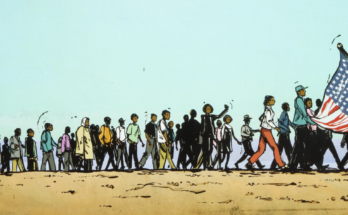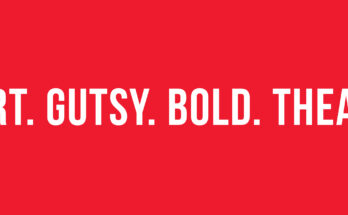Jeff Whitty doesn’t ever, ever want to create a musical on Broadway.
That’s good news for theater audiences in Atlanta, and the reason that Whitty, the Tony Award-winning book writer of Avenue Q, can be found night and day at the Alliance Theatre. He’s part of an all-star team there to incubate the world premiere musical Bring It On, about the high-stakes world of competitive cheerleading.
Team members are some of the most acclaimed young creators in the world of musical theater today. Collectively, they own three Tony Awards, three Tony nominations, a bucketful of Drama Desk Awards/nominations and a Pulitzer. In addition to Avenue Q, they’re the men and women behind Next to Normal, In the Heights, American Idiot, High Fidelity and Everyday Rapture – almost all musicals with a brain, a heart and a contemporary sound.
For Bring It On: The Musical, Whitty is writing the libretto. The music is by Tom Kitt (Next to Normal) and Lin-Manuel Miranda (In the Heights). The lyrics are by Miranda and Amanda Green (daughter of Phyllis Newman and the great Adolph Green). Andy Blankenbuehler (In the Heights, 9 to 5) directs and choreographs the piece, which reportedly hits its own heights with cheerleading competitors often tossed toward the rafters. Producer Mike Isaacson of Fox Theatricals calls it a “hip-hoppy dancing ballet that never stops.”
Bring It On runs Jan. 15 to Feb. 20 at the Midtown playhouse. It’s a blending of the original 2000 film and the four direct-to-video sequels it spawned (along with a cult following). The Alliance run is the creators’ chance to see in 3-D what they’ve crafted. Then comes six to eight months on the road, during which Blankenbuehler and Co. can tinker, tighten and improve as they see fit. Will Bring It On eventually play Broadway? It might, but that isn’t necessarily the end goal for this project.
What we’re seeing with this team is no less than the future of the American musical, which is at a crossroads. Broadway has become more and more expensive. These economics have for some time had backers playing it safe. They generally want big names, big stars, familiar titles and proven track records — not necessarily the things that promote high artistry. That’s where places like the Alliance, and the Berkeley Repertory and La Jolla Playhouse, both in California, come in.
“There is a culture war on Broadway right now between art and entertainment,” producer Isaacson says. “The last instant overnight hit was, I think, The Producers.” And that was in 2001.
Both the longest-running Broadway shows of all time and the highest-grossing current shows prove Isaacson’s point — the art vs. entertainment battle and the birthing processes.
The Phantom of the Opera is more spectacle that art, and an import. Les Misérables is a tad more art than spectacle but also an import. Chicago, built for Broadway, blends the two. Then you have A Chorus Line, a crowd-pleasing, artistic Tony and Pulitzer juggernaut, and the revival of Oh, Calcutta! A Chorus Line began as an experiment at Joe Papp’s Public Theater and became the first show ever developed through workshops, now a common practice. Oh, Calcutta!, well, is Oh, Calcutta!, its purpose nakedly obvious.
Today’s top-selling shows, according to recent figures from Playbill Online, continue this schizophrenia. The Merchant of Venice, with Al Pacino, is a summertime transfer from the Public Theatre and Central Park. Spider-Man: Turn Off the Dark, the high-flying extravaganza from Julie Taymor (The Lion King), Bono and the Edge, is wholly commercial. Wicked tried out in San Francisco before moving to Broadway, and Jersey Boys was polished at the La Jolla Playhouse near San Diego. The just-closed Scottsboro Boys, the last musical by Kander and Ebb, about the infamous “Scottsboro” case of the 1930s, in which a group of African-American teenagers were unjustly accused of attacking two white women, began at off-Broadway’s Vineyard Theatre and sat down at Minnesota’s storied Guthrie Theatre before landing on Broadway.
The key in every case, says Bring It On’s Kitt, is finding something that “needs to be a musical,” whether is comes from literature, Hollywood or is original. “No bells and whistles can save a show that doesn’t work.”
At a roundtable discussion at the Alliance, his creative collaborators voiced their agreement:
- “Musicals should be entertaining,” lyricist Green says, “but should also be intelligent, with a brain and a heart.”
- “Part of the American musical theater is heading toward big spectacles that, for me, are not satisfying,” says Whitty. “I think what audiences want to see is people relating to each other.”
- Isaacson insists, “You have to really fight for a musical today.”
Regardless of the end result, Bring It On gives Atlanta a chance to see what this rare collection of talented human beings can do. As Alliance Theatre Jennings Hertz, Jr. Artistic Director Susan V. Booth so rightly says, it’s “a chemistry project of talent that is a once-in-a-generation event.”
::
Kathy Janich is an Atlanta theater artist and freelance writer. After years in daily newspapers, she’s found a joyous second career as an artistic associate at Atlanta’s Synchronicity Theatre. Visit synchrotheatre.com.



